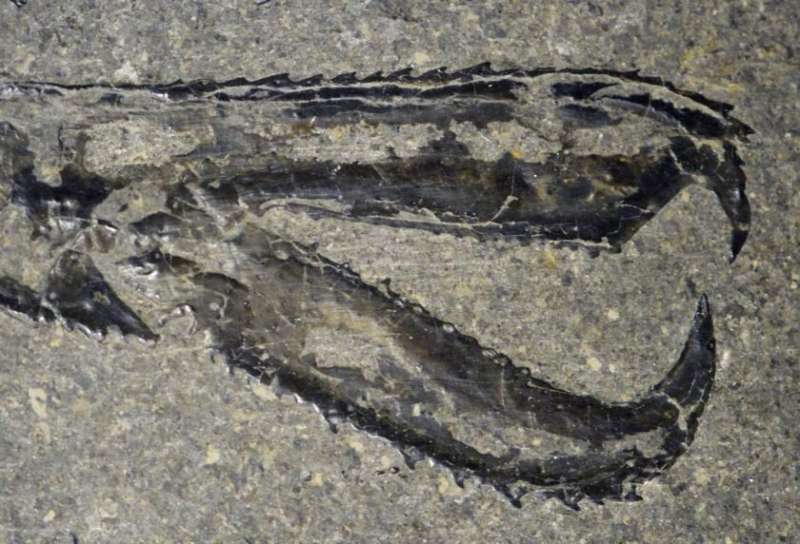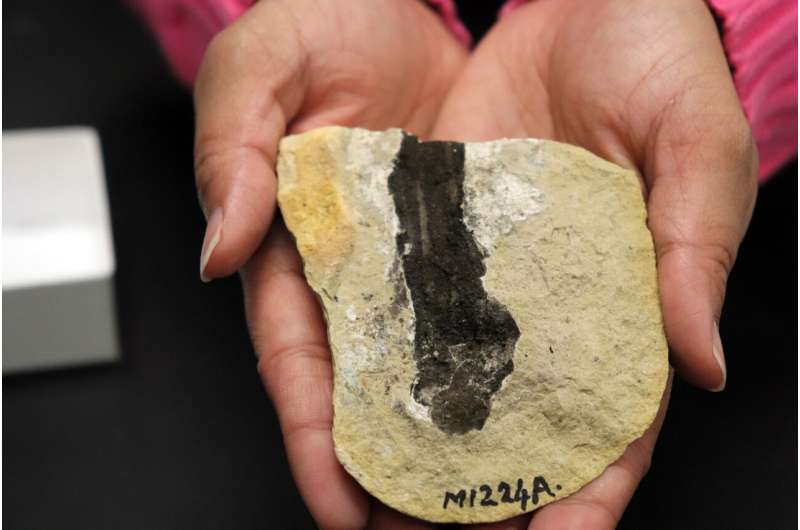WASHINGTON (AP) — Scientists have found the oldest known ancestor of octopuses – an approximately 330 million-year-old fossil unearthed in Montana.
The researchers concluded the ancient creature lived millions of years earlier than previously believed, meaning that octopuses originated before the era of dinosaurs.
The 4.7-inch (12-centimeter) fossil has 10 limbs — modern octopuses have eight — each with two rows of suckers. It probably lived in a shallow, tropical ocean bay.
“It's very rare to find soft tissue fossils, except in a few places,” said Mike Vecchione, a Smithsonian National Museum of Natural History zoologist who was not involved in the study. “This is a very exciting finding. It pushes back the ancestry much farther than previously known."
The specimen was discovered in Montana's Bear Gulch limestone formation and donated to the Royal Ontario Museum in Canada in 1988.
For decades, the fossil sat overlooked in a drawer while scientists studied fossil sharks and other finds from the site. But then paleontologists noticed the 10 tiny limbs encased in limestone.
The well-preserved fossil also “shows some evidence of an ink sac,” probably used to squirt out a dark liquid cloak to help to evade predators, just like modern octopuses, said Christopher Whalen, an American Museum of Natural History paleontologist and co-author of the study published Tuesday in the journal Nature Communications.
The creature, a vampyropod, was likely the ancestor of both modern octopuses and vampire squid, a confusingly named marine critter that’s much closer to an octopus than a squid. Previously, the “oldest known definitive” vampyropod was from around 240 million years ago, the authors said.
The scientists named the fossil Syllipsimopodi bideni, after President Joe Biden.
Whether or not having an ancient octopus — or vampire squid — bearing your name is actually a compliment, the scientists say they intended admiration for the president's science and research priorities.
___
The Associated Press Health and Science Department receives support from the Howard Hughes Medical Institute’s Department of Science Education. The AP is solely responsible for all content.
Christina Larson, The Associated Press
Scientists describe a new species of vampyropod from a 328-million-year-old, 10-armed fossil found in Montana.

By Sabrina Imbler
March 8, 2022
About 328 million years ago, Fergus County, Mont., was no stranger to monsoons. Back then, the region was a marine bay, much like the Bay of Bengal in South Asia. The tropical storms regularly flushed the bay with freshwater and fine sediments, feeding algal blooms and depleting the water of oxygen in certain spots. Anything that died in these spots could have the rare posthumous luck of being preserved, undisturbed.
When an ancient octopus died in these waters, its soft, squishy body was buried and pristinely fossilized. The fossil was originally donated to the Royal Ontario Museum in Canada in 1988 but sat in a drawer for decades until Christopher Whalen, a paleontologist from the American Museum of Natural History in New York, pulled it out of a drawer and noticed its preserved arms. When he looked under a microscope, he saw small suckers dimpling the rock.
“That’s incredibly rare,” Dr. Whalen said.
Thomas Clements, a paleobiologist at the University of Birmingham in England, said, “The probability of these tiny little bags of water turning into fossils is just astronomically low.”
Intrigued, Dr. Whalen studied the fossil, expecting it would resemble other cephalopods found in the Montana limestone. But it turned out to be something quite different. Dr. Whalen and colleagues say the fossil represents the oldest known ancestor of vampyropods, a group that includes vampire squids and octopuses, pushing back the earliest evidence of the group by 82 million years. Dr. Whalen and Neil Landman, a curator emeritus at the museum, describe the new species in a paper published Tuesday in the journal Nature Communications.
They named it Syllipsimopodi bideni, as in President Biden, to commemorate the start of his presidency and because they “were encouraged by his plans to address climate change and to fund scientific research,” Dr. Whalen said in an email. Mr. Biden is not the first president to have a species named after him. A wormlike caecilian and a moth with a yellow crown of scales were named after President Donald J. Trump. Nine species were named after President Barack Obama, including several fish and a lichen.
The White House did not respond to a request for comment.
But there’s a lot more to the discovery — including some dispute — than its presidential name.

The new fossil, which has 10 arms, is the oldest known cephalopod to have suckers on its arms. Modern squids and cuttlefish have 10 arms and octopuses have eight. Vampire squids (which are not squids but close relatives of octopuses) have eight arms and two stringy filaments, thought to be vestigial arms. So the 10-armed S. bideni shows that all cephalopods once had 10 arms, before they were reduced to filaments and ultimately lost.
Christian Klug, a paleontologist at the University of Zurich in Switzerland who was not involved with the research, expressed reservations about the new paper. He says the fossil most likely represents a specimen of a known species of ancient cephalopods, Gordoniconus beargulchensis. In 2019, Dr. Klug published a paper on the anatomy of G. beargulchensis with Dr. Landman.
“It’s the exact same size, the exact same age, the exact same locality, the exact same proportions and it’s just preserved a little bit differently,” Dr. Klug said.
The new paper relies heavily on visual methods of analysis, and these questions could be resolved with chemical analyses, said Dr. Clements, who was not involved with the research. “With a full suite of techniques, we would definitely have more clues or a lot more answers,” he said, noting that these techniques can be expensive.
When Dr. Whalen first examined the fossil, he looked for the phragmocone, a chambered shell characteristic of most fossil cephalopods that helps them control buoyancy. A nautilus’s phragmocone is its coiled shell; a cuttlefish’s is its cuttlebone. The fossilized chambers of a phragmocone are divided by mineralized sheets, which are very distinctive and generally well-preserved, Dr. Whalen said.
The fossil of G. beargulchensis, which is held at the American Museum of Natural History, preserves these distinct sheets, Dr. Whalen said. Because that fossil and S. bideni were preserved at the same site and in the same environment, both should have preserved lines, the authors argue. But S. bideni had no trace of these lines, suggesting the creature never had an inner chambered shell.
Dr. Whalen also expected to see evidence of a primordial rostrum, a mineralized counterweight to ensure early cephalopods could swim horizontally. But the fossil of S. bideni had no rostrum, suggesting “it was never there to begin with,” Dr. Whalen said.
Instead, the researchers’ analysis found that S. bideni’s inner shell is a gladius, a triangular shell-like remnant found in squids and vampire squids. “It’s really not something that anyone expected to see in an animal this old,” Dr. Whalen said. “We knew we were looking at an early vampyropod.”
Dr. Klug disputed this conclusion, suggesting the shell is instead a deformed phragmocone and body chamber of G. beargulchensis, the known cephalopod.
Dr. Whalen disagreed. He said the measurements of the new fossil are distinct enough to mark a new species, “even if you disagree with our interpretation that we’re looking at gladius and not a phragmocone and looking at a vampyropod and not something else.”
Dr. Clements hopes a future chemical analysis can confirm the presence of the suckers, which he said were hard to discern from the images included in the study.
The suckers may be a small part of S. bideni’s story, but Dr. Whalen is indebted to them. “This was sitting in a museum since the ’80s, and no one realized it was important,” he said. “We chanced on that importance because I happened to notice the arm suckers.”
Katie Rogers contributed reporting.














